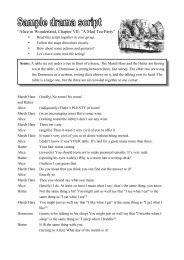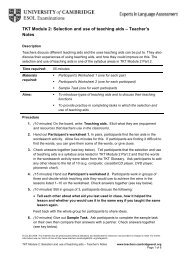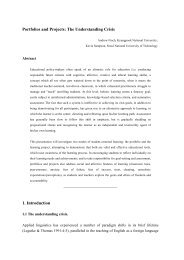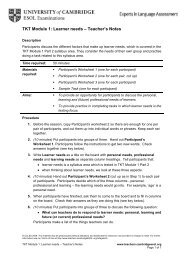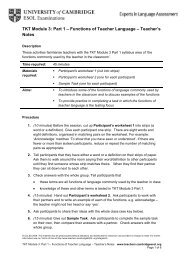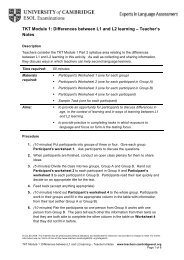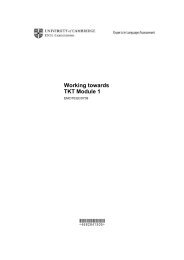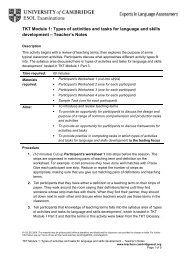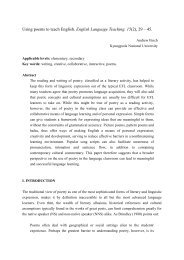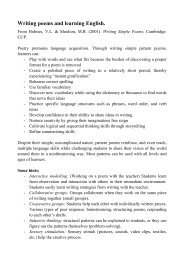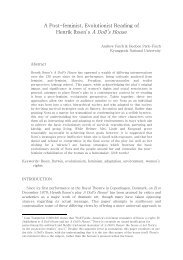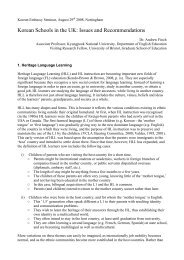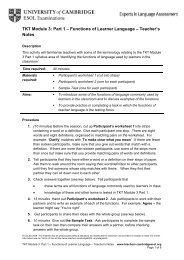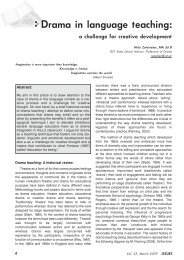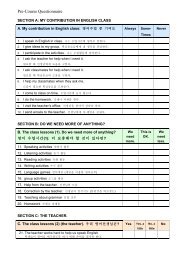Choosing assessment activities - Finchpark
Choosing assessment activities - Finchpark
Choosing assessment activities - Finchpark
Create successful ePaper yourself
Turn your PDF publications into a flip-book with our unique Google optimized e-Paper software.
TKT Module 2: <strong>Choosing</strong> <strong>assessment</strong> <strong>activities</strong> – Teacher’s NotesDescriptionThis activity encourages participants to consider different aspects of <strong>assessment</strong> andfamiliarises them with the idea of formal and informal <strong>assessment</strong>. They discuss different<strong>assessment</strong> <strong>activities</strong>, all of which are tested in the TKT Module 2 Part 1 syllabus arearelating to choosing <strong>assessment</strong> <strong>activities</strong>.Time required:Materialsrequired:50 minutes• Participant’s Worksheet 1 (cut into strips)• Participant’s Worksheet 2 (one for each participant)• Sample Task (one for each participant)Aims: • To discuss <strong>assessment</strong>, including formal and informal <strong>assessment</strong>Procedure• To provide an opportunity for participants to discuss <strong>assessment</strong><strong>activities</strong> and reasons for choosing them.• To provide practice in completing tasks in which choosing<strong>assessment</strong> <strong>activities</strong> is the testing focus.1. Before the session, copy and cut up Participant’s worksheet 1 so there are enoughstrips for one per pair of participants.2. (10 minutes) Put participants into pairs (with one group of 3 if there is an odd numberin the group) and give each pair a strip from Participant’s worksheet 1. Tellparticipants that each strip has a question connected with <strong>assessment</strong>. Participantsdiscuss possible answers to their question with their partner. Allow one minute forthis.3. Participants then walk around the room in pairs, gathering answers to their questionfrom other pairs, i.e. working in groups of 4. When participants have finished, theyshould sit with their partner and discuss the answers they were given.4. Feed back together so that participants can share their answers (see key below). Tryto finish with the last question on the worksheet How do teachers assess learners?The answer to this, formal and informal <strong>assessment</strong>, leads to the next exercise.Point out that choosing <strong>assessment</strong> <strong>activities</strong>, including informal and formal<strong>assessment</strong>, is a syllabus area tested in TKT Module 2 Part 1.5. (10 minutes) Hand out Participant’s worksheet 2. In pairs, participants look at the<strong>assessment</strong> tasks, marking processes, and main reasons for <strong>assessment</strong> in the gridand decide whether they are connected mostly with formal <strong>assessment</strong> or informal<strong>assessment</strong>. They complete the table with F or I accordingly. Check answerstogether (see key below). Note that some of the reasons could be open for debate,e.g. 11, depending on who is assessing and how it is done.© UCLES 2009. This material may be photocopied (without alteration) and distributed for classroom use provided no charge is made. For furtherinformation see our Terms of Use at http://www.teachers.cambridgeESOL.org/ts/legalinfoTKT Module 2: <strong>Choosing</strong> <strong>assessment</strong> <strong>activities</strong> – Teacher’s Noteswww.teachers.cambridgeesol.orgPage 1 of 6
6. (10 minutes) Participants now work in groups of three to brainstorm different <strong>activities</strong>and tasks that are used for formal <strong>assessment</strong> and informal <strong>assessment</strong>. Elicit acouple of examples to get them started, e.g. multiple choice questions, gap fill tasks.7. Feed back with the whole group so that participants can share their ideas (see keybelow)8. (15 minutes) Give out Sample Task. Participants complete the sample task on theirown then compare their answers with a partner. Check answers together (see keybelow).9. (5 minutes) Round up to summarise points covered. Ask participants:• What is the TKT Module 2 syllabus area for this lesson? (choosing<strong>assessment</strong> <strong>activities</strong>)• What kind of <strong>assessment</strong> <strong>activities</strong> do you do with your students? (allowparticipants to share ideas)• Which <strong>activities</strong> do you find most useful for learning about your students’progress? (allow participants to share ideas).• What do you think learners feel about <strong>assessment</strong>? (allow participants toshare ideas)© UCLES 2009. This material may be photocopied (without alteration) and distributed for classroom use provided no charge is made. For furtherinformation see our Terms of Use at http://www.teachers.cambridgeESOL.org/ts/legalinfoTKT Module 2: <strong>Choosing</strong> <strong>assessment</strong> <strong>activities</strong> – Teacher’s Noteswww.teachers.cambridgeesol.orgPage 2 of 6
TKT Module 2: <strong>Choosing</strong> <strong>assessment</strong> <strong>activities</strong> – Answer KeysKey to Participant’s worksheet 11. What is<strong>assessment</strong>?2. Why do teachersassess students?3. Do students assessteachers? Is thisgood? Why?4. What do teachersassess?5. When do teachersassess students?6. How do teachersassess students?• collecting information about students’ progress to find outabout their learning• finding out what students know• to find out what students have learnt in lessons• to find out what students know at the start of a class• to decide on what to teach students• yes, students assess teachers• it is good because it helps teachers to evaluate theirlessons and their teaching• students’ language (grammar, vocabulary) and languageskills (reading, listening, writing, speaking)• students’ attitude• students’ progress• all the time• formally: in tests, for example• informally: during classroom <strong>activities</strong>, for exampleKey to Participant’s Worksheet 2 Exercise 11 F 2 I 3 I 4 F 5 I 6 I7 F 8 F 9 I 10 I 11 FKey to Participant’s Worksheet 2 Exercise 2• multiple choice questions• gap fill tasks• true/false questions• matching tasks• ordering tasks• writing tasks (e.g. letters, essays, postcards, emails,stories notes)• speaking tasks (e.g. interviews, discussions, role-plays,presentations, practice <strong>activities</strong>)• listening comprehension tasks• reading comprehension tasks• language games, quizzesKey to Sample Task1 B 2 E 3 A 4 F 5 C© UCLES 2009. This material may be photocopied (without alteration) and distributed for classroom use provided no charge is made. For furtherinformation see our Terms of Use at http://www.teachers.cambridgeESOL.org/ts/legalinfoTKT Module 2: <strong>Choosing</strong> <strong>assessment</strong> <strong>activities</strong> – Answer Keyswww.teachers.cambridgeesol.orgPage 3 of 6
TKT Module 2: <strong>Choosing</strong> <strong>assessment</strong> <strong>activities</strong> – Participant’sWorksheet 1What is <strong>assessment</strong>?Why do teachers assess students?Do students assess teachers? Is this good? Why?What do teachers assess?When do teachers assess students?How do teachers assess students?© UCLES 2009. This material may be photocopied (without alteration) and distributed for classroom use provided no charge is made. For furtherinformation see our Terms of Use at http://www.teachers.cambridgeESOL.org/ts/legalinfoTKT Module 2: <strong>Choosing</strong> <strong>assessment</strong> <strong>activities</strong> – Participant’s Worksheet 1 www.teachers.cambridgeesol.orgPage 4 of 6
TKT Module 2: <strong>Choosing</strong> <strong>assessment</strong> <strong>activities</strong> – Participant’sWorksheet 2Exercise 1Look at the <strong>assessment</strong> tasks, marking processes, and main reasons for <strong>assessment</strong> belowand decide whether they are connected mostly with formal <strong>assessment</strong> or informal<strong>assessment</strong>.If you think they relate mostly to formal <strong>assessment</strong>, mark F in the box. If you think they areconnected mostly with informal <strong>assessment</strong> mark I in the box.Assessment tasks, marking processes, and reasons for <strong>assessment</strong>F / I1. exams2. The teacher keeps a note of strengths and weaknesses but doesn’t givestudents a grade for their work.3. classroom <strong>activities</strong>, e.g. discussions and role-plays4. Students get a grade for their work, e.g. Pass/ Fail, 65 %5. to help teachers to select appropriate materials and <strong>activities</strong> for lessons6. to give feedback to learners about how they can improve their learning7. to assess overall language ability or proficiency8. to assess learning at the end of a course, to decide if learners can move on tothe next level9. homework tasks10. to provide feedback to the teacher so that she can find out what aspects of herteaching are useful and successful11. testsExercise 2In groups of three, make a list of <strong>activities</strong> and tasks that are used for formal andinformal <strong>assessment</strong>.© UCLES 2009. This material may be photocopied (without alteration) and distributed for classroom use provided no charge is made. For furtherinformation see our Terms of Use at http://www.teachers.cambridgeESOL.org/ts/legalinfoTKT Module 2: <strong>Choosing</strong> <strong>assessment</strong> <strong>activities</strong> – Participant’s Worksheet 2 www.teachers.cambridgeesol.orgPage 5 of 6
TKT Module 2: <strong>Choosing</strong> <strong>assessment</strong> <strong>activities</strong> – Sample TaskFor questions 1–5, match the situations in which a teacher sets a test with the reasons for<strong>assessment</strong>, A–F.Mark the correct letter (A–F) on your answer sheet.There is one extra option which you do not need to use.Situations1 The teacher has a new class. On the first day of the course, she sets a test whichcovers some of the language points she expects the students to be familiar with andothers that she thinks the students may not know. The students do not prepare forthe test.2 The teacher notices that his intermediate students are making careless mistakes withbasic question formation, which they should know. He announces that there will be atest on this the following week. The students have time to prepare for the test.3 The students are going to take a public examination soon. The teacher givers theman example paper to do under test conditions.4 The teacher monitors students whenever they carry out speaking tasks and keepsnotes about each student.5 The class has recently finished a unit of the course book which focused on the use ofthe present perfect simple with ‘for’ and ‘since’. The teacher gives the class asurprise test on this.Reasons for <strong>assessment</strong>ABCto familiarise students with the test formatto allow the teacher to plan an appropriate scheme of workto show students how well they have learned a specific language pointDEto allow students to assess each otherto motivate the students to revise a particular language areaFto assess students’ progress on a continuous basis© UCLES 2009. This material may be photocopied (without alteration) and distributed for classroom use provided no charge is made. For furtherinformation see our Terms of Use at http://www.teachers.cambridgeESOL.org/ts/legalinfoTKT Module 2: <strong>Choosing</strong> <strong>assessment</strong> <strong>activities</strong> – Sample Taskwww.teachers.cambridgeesol.orgPage 6 of 6



